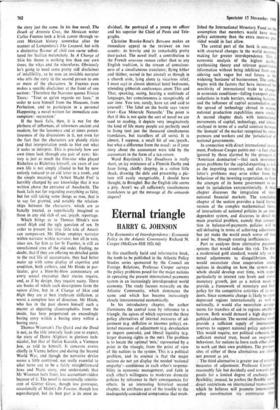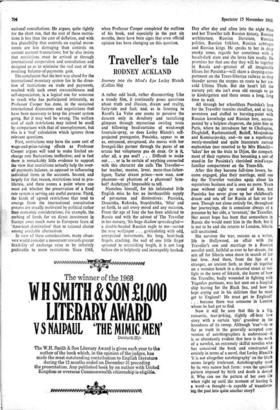Eternal triangle
HARRY G. JOHNSON
In this excellently lucid and informative book, the tenth to be published in the Atlantic Policy Studies series sponsored by the Council on Foreign Relations, Professor Cooper surveys the policy problems posed for the major nations in operating the present international payments system in an increasingly interdependent world economy. The study focuses naturally on the Atlantic Community, which dominates the scene and which has become increasingly closely interconnected economically.
In his introductory chapter, the author illuminates the central issue by reference to a triangle, the apices of which represent the three policy alternatives of internal measures of ad- justment (e.g. deflation or incomes policy), ex- ternal measures of adjustment (e.g. devaluation or import controls), and liberal liquidity (e.g. larger drawing rights in the IMF). The problem is to locate the optimal 'mix,' represented by a point in the triangle, from the point of view of the nations in the system. This is a politiCal problem, and its essence is that the major nations do not yet display the needed 'national empathy'—confidence in each other's responsi- bility in economic management, and faith in each other's willingness to moderate domestic policies by reference to their consequences for others. In an interesting historical second chapter, he attributes part of the trouble to the inadecivately-considered compromise that e.stab- lished the International Monetary Fund on the assumption that members would have more policy autonomy than the extra reserves pro. vided would in fact allow.
The central part of the book is concerned with structural changes in the world economy making for greater interdependence. This is economic analysis of the highest quality, synthesising theory and relevant quantitative information without being inhibited from con- sidering such vague but real forces as the widening 'horizons' of businessmen. The author begins with the factors that have increased the sensitivity of international trade to changes in economic conditions—falling transport costs, reductions in trade barriers, widening horizons, and the influence of capital accumulation and the spread of technology abroad in making national production capabilities more similar. A second chapter deals with international movements of capital, technology, and labour, analysed in terms of a useful contrast between the 'domain' of the market recognised by entre- preneurs and workers and ,the `jurisdiction' of national governments.
In connection with direct international invest- ment, Professor Cooper pointi out—a fact often ignored by those alarmed by the prospect of `American domination'—that such investment poses problems for the capital-exporting as well as the importing countries, and also that the latter's problems may arise either from the behaviour of the investing corporation, or from the attempts of its home government to ex- tend its jurisdiction extraterritorially. A third chapter discusses the integration of inter- national financial markets. The concluding chapter of the section provides a lucid literary version of the complex mathematical theory of interactions of national policies in an inter- dependent system, and discusses in detail the main practical problem, namely that competi- tion in balance-of-payments policies will be self-defeating in terms of achieving adjustment, but yet make the world much worse off than it need be, through creating inefficiencies.
Part tut analyses three alternative payments systems that would reduce this risk. The first, a. modernised gold standard, would rely on in- ternal adjustments to disequilibrium. This would necessitate close -cooperation among nations in deciding on how the system as a whole should develop over time, with respect particularly to interest rate levels and overall monetary growth, just as a nation needs to provide a framework of monetary and fiscal policy for the competitive activities of its resi- dents. Since economic change is likely to create depressed regions internationally as well as nationally, it would also necessitate arrange- ments for transfers of aid, to regions unable to borrow. Both would demand a high degree of political cohesion. The second alternative would provide a sufficient supply of . international reserves to support national- policy autonomy. This would require, not political cohesion, but sufficient mutual trust, based on responsible behaviour, for nations to leave each other alone to work out their own problems. The prerequr sites of either of these alternatives are clear!y not present as yet. The third alternative is greater use of external -measures of adjustment. Professor Cooper is reasonably fair but decidedly coottowards pro- posals for a limited degree of exchange rate flexibility; instead, he prefers the flexible use et direct restrictions on international transactions which he believes will promote international policy coordination via continuous if:W.
national consultations. He argues, quite rightly for the short run, that the cost of these restric- tions is less than the cost of deflation, and with less plausibility that controls on capital move- ments are less damaging than controls on current account transactions; but he also insists that restrictions must be arrived at through international cooperation and consultation and designed so as to minimise the real cost of the resulting balance-of-payments gain.
The conclusion that the best way ahead for the international monetary system lies in the direc- tion of restrictions on trade and payments, reached with such sweet reasonableness and self-depreciation, is a logical one for someone to reach who has participated intimately, as Professor Cooper has done, in the sustained international discussions and negotiations that have been necessary to keep the present system going. But it may well be wrong. The welfare cost of such restrictions may indeed be small by comparison with that of unemployment, but this is a 'real' calculation which ignores three relevant questions.
First, restrictions may have the same sort of wage-and-price-raising effects as Professor Cooper argues will tend to make limited ex- change rate fluctuations ineffective; and in fact there is remarkably little evidence to support the view that restrictions actually help the over- all payments balance, as opposed to influencing individual items in the accounts. Second, and largely for that reason, restrictions tend to pro- liferate, and there comes a point where one must ask whether the preservation of a fixed rate system is serving any useful purpose. Third, the kinds of agreed restrictions that tend to emerge from the international consultative process are usually motivated by political rather than economic considerations; for example, the curbing of funds for vs direct investment in Europe owes much more to European fears of `American domination' than to rational choice among available alternatives.
In view of these considerations, many obser- vers would consider a movement towards greater flexibility of exchange rates to be infinitely preferable to more restrictions. Since 1965, when Professor Cooper completed the outlines of his book, and especially in the past six months, there have been signs that even official opinion has been changing on this question.







































 Previous page
Previous page